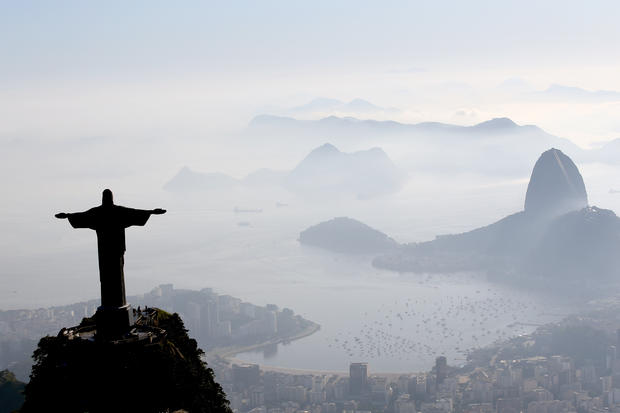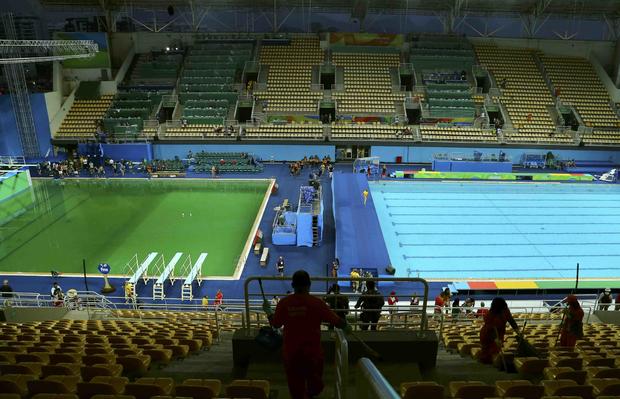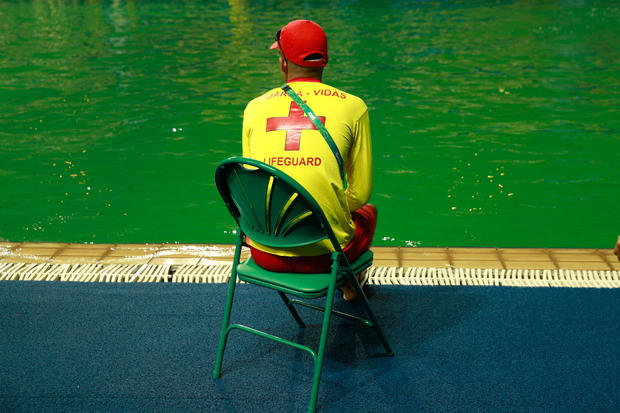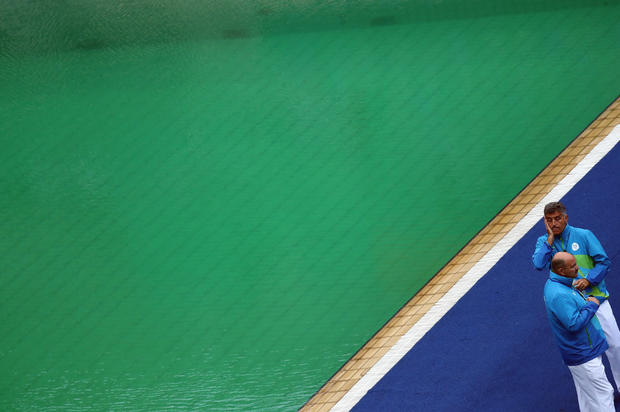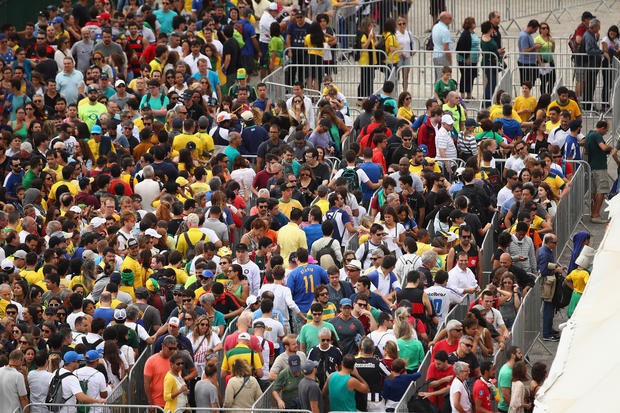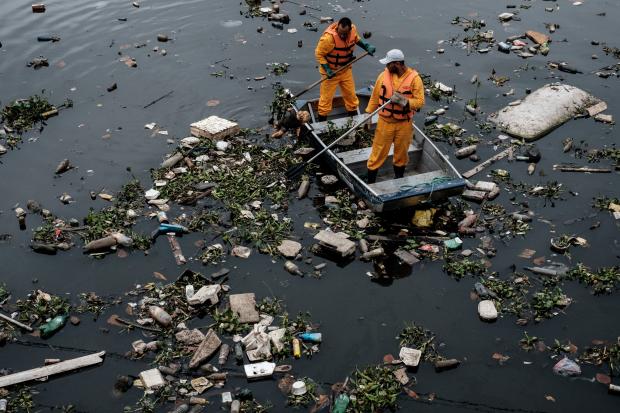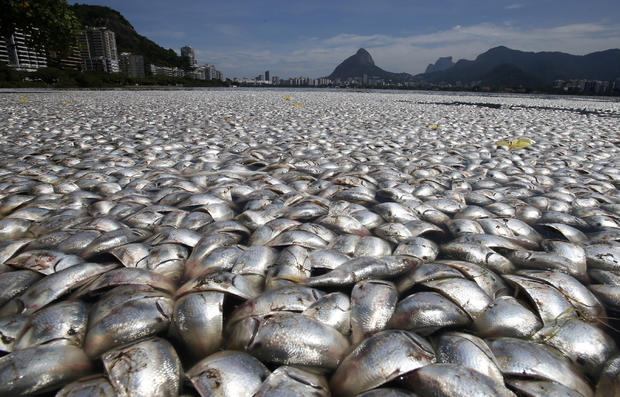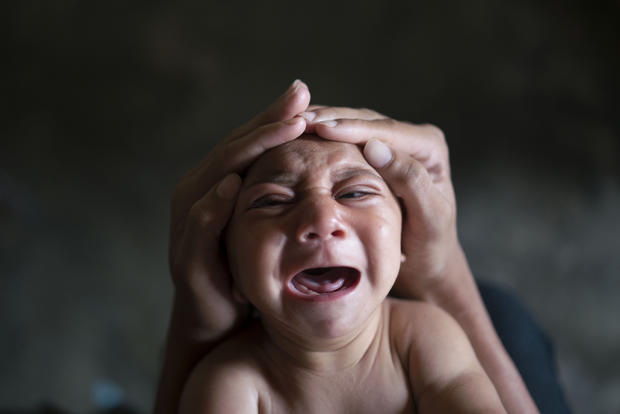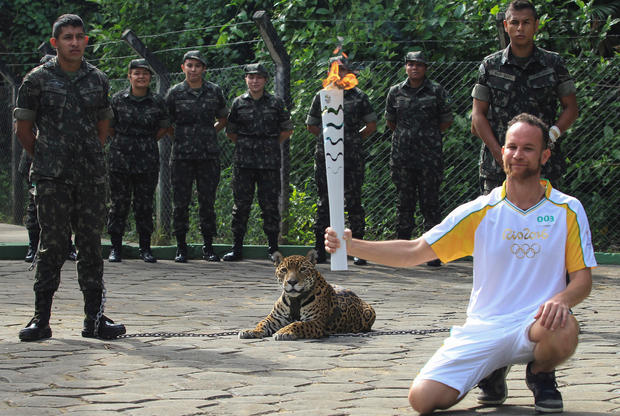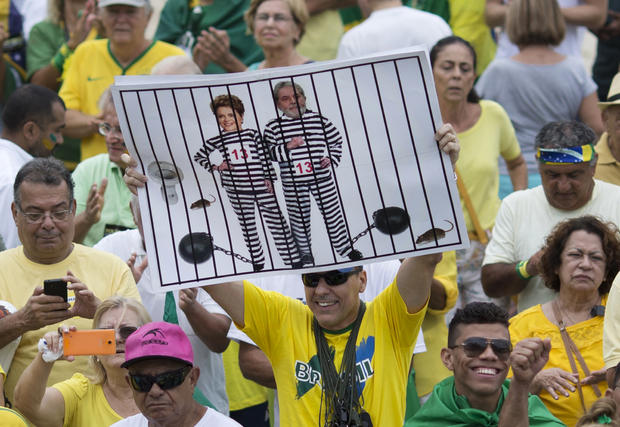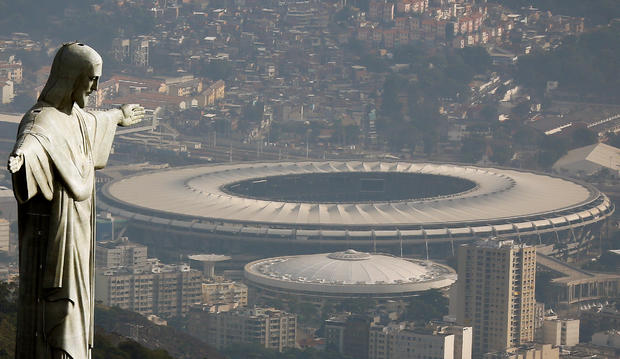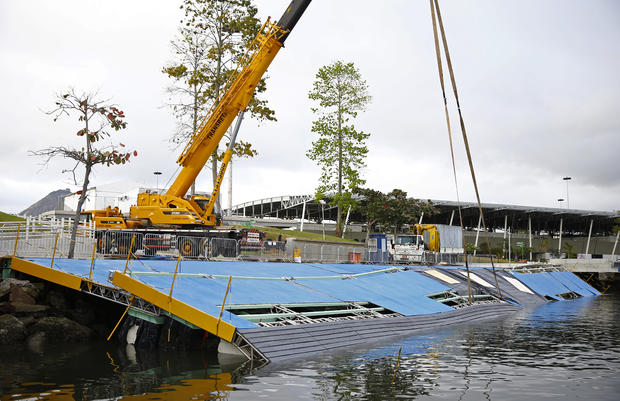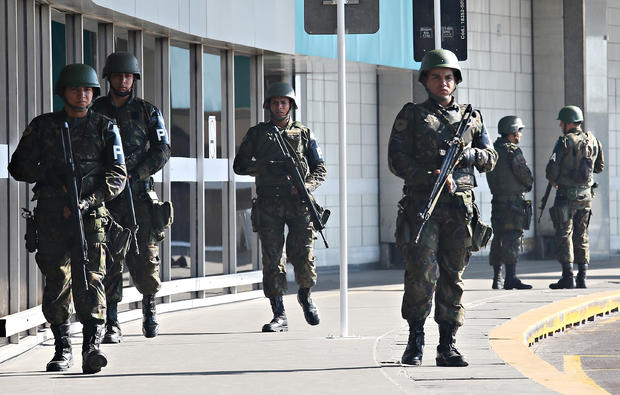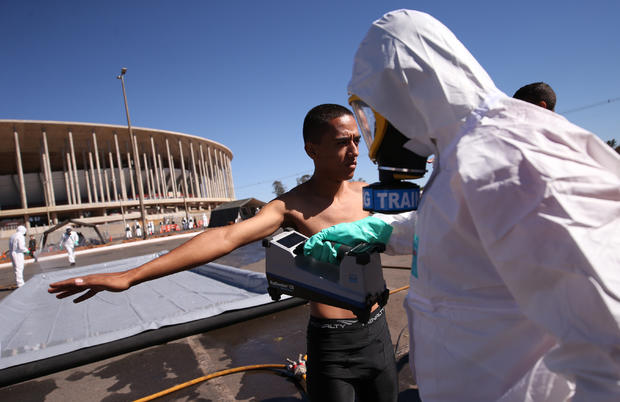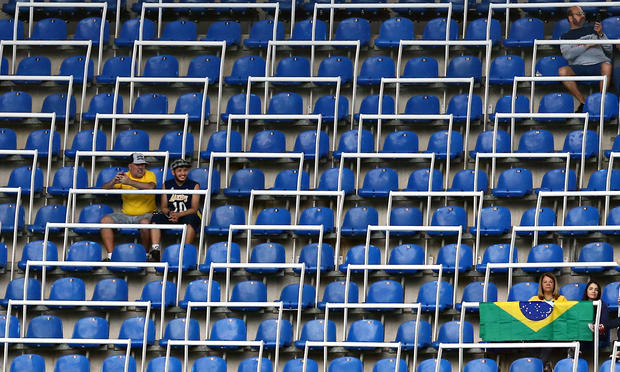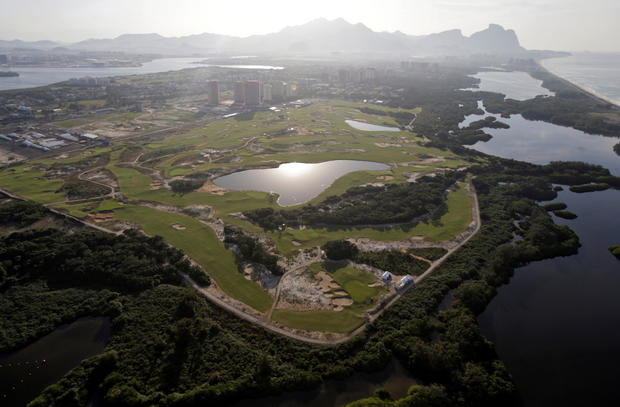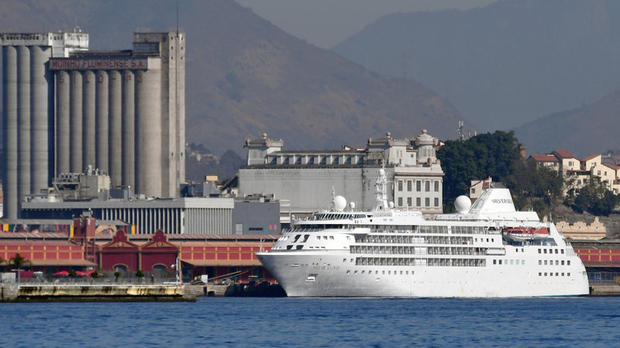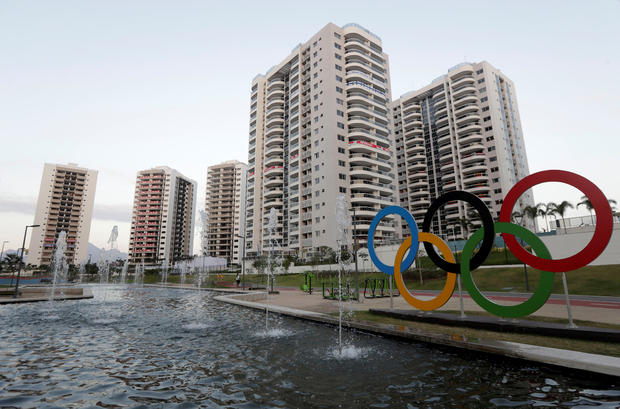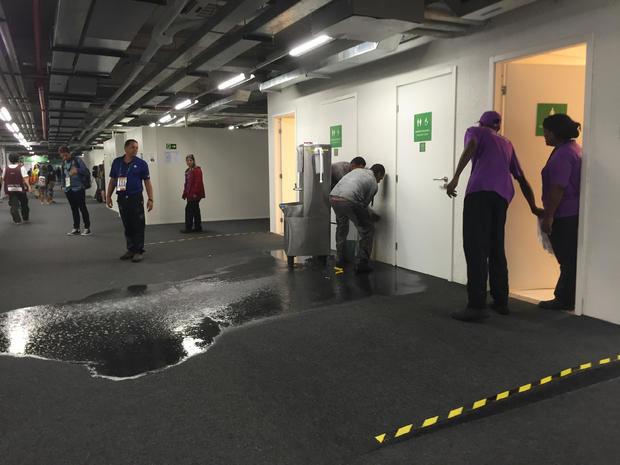Olympic-sized woes plague Rio
South America's first-ever Olympic Games in Rio de Janeiro have been plagued by a long list of problems--everything from the Zika epidemic to severe water pollution and major security concerns.
How bad are things? It's certainly a long list of woes ahead of the summer Olympics.
Green pool
Green, not gold, was the color of the day at the Olympic diving venue the first week of the Olympics on Aug. 9, 2016.
The divers at the 2016 Rio Olympics were landing in pristine, well-maintained, crystal-clear blue water on Monday, Aug 8, 2016. During Tuesday's competition, many noticed something ... different ... about the water in the diving pool (L) at the Maria Lenk Aquatic Center.
Green pool
The kale-colored murky water wasn't just a cosmetic nuisance; it was so dark that divers couldn't see the bottom of the pool.
Water quality has been a major issue surrounding the Rio de Janeiro Olympics, but in the ocean and lagoons, not the pools. Officials were flumoxed by the color change, "We don't know exactly what happened," organizing committee spokesman Mario Andrada said initially.
FINA, the world governing body of aquatics, said in a statement that the water tanks ran out of water treatment chemicals.
The dark green was then explained as having been caused by algae and organizers stressed that there was no danger posed to athletes, promising a return to blue. BUT yet another pool turned green--this time it was the one for water polo.
Green pool
Subsequently, water polo athletes have also been complaining that too much chlorine has been been put in their pool causing eyes to sting and affecting their performance. Some, such as Gergo Zalank of Hungary, have expressed that something other than chlorine in the water is hurting their eyes.
On Friday Aug. 12, British diver Tom Daley let people know in a tweet, "Diving pool is closed this morning. Hopefully that means we haven't been diving in anything too bad the last couple of days!"
The FINAL official answer was human error--160 liters of hydrogen peroxide mistakenly dumped into the pools on Aug. 5--according to the New York Times. The hydrogen peroxide dump neutralized pool chlorine and made way for "organic compound" growth possibly including algae. In order to fix the problem the pool which is needed for synchronized swimming was drained of all its 3,725,000 liters of water and filled with clear water from a practice pool.
Long lines
Large crowds queue at security to enter the Tennis center on Day 6 of the 2016 Olympics in Rio on August 11, 2016.
It is the combination of large crowds and woefully understaffed facilities that have created complaints about long wait times of more than an hour to get into venues as well as to get food.
Those lines have been accompanied by interminable waits for transportation and generally extremely long trips from venue to venue.
Transportation
Long bus rides aren't as bad as dangerous ones however. This official media bus carrying accredited journalists, had windows shattered by projectiles on the way to the Main Transport Mall from the Deodoro venue in Rio, August 9, 2016. Two people were slightly injured.
Filthy water
Human body parts recently washed up on Copacabana Beach next to the Olympic beach volleyball arena. In addition to volleyball, the area will host marathon swimming.
And there are significant health concerns related to sporting events in Guanabara Bay, a major black eye on Rio's Olympic project that has set off alarm bells among sailors, rowers and open-water swimmers. Debris in the bay includes large furniture and plenty of plastic bags. Rain has flushed more raw human sewage teeming with dangerous viruses and bacteria into the bay.
An Associated Press survey revealed the problem to be so extreme that swimmers and athletes who ingest just three teaspoons of water are almost certain to be infected with viruses that can cause stomach and respiratory illnesses and more rarely heart and brain inflammation.
Athletes are coping the best they can by, among other things, taking antibiotics, bleaching oars and wearing plastic suits and gloves in a desperate effort to limit contact with the water. Dr. Valerie Harwood, the chair of the department of integrative biology at the University of South Florida, gave this advice, "Don't put your head underwater," and said swimmers risk "getting violently ill."
Polluted water
Rio's Rodrigo de Freitas lagoon is meant to be one of the city's most picturesque locations. Yet, the lagoon, which will host the rowing and canoe sprint competitions in the 2016 Olympic Games, has significant environmental problems. It suffers from chronic fish kills due to algae. In 2015, 11 members of the U.S. team and 4 coaches suffered stomach illnesses during the World Junior Rowing Championships held at the lagoon. Two of the athletes needed to receive IVs. Though the government has attempted to cleanup waterways there's much left to be done.
Zika virus
Brazil is at the epicenter of the current Zika outbreak, with more than 100,000 cases of the mosquito-borne illness reported in that country. With more than a million spectators and 10,000 athletes arriving in Brazil concerns have been rife despite the World Health Organization (WHO) stating there is a "very low risk" of further international spread of the Zika virus as a result of the Rio Olympic Games back in June.
Zika has already spread through most of Latin America and the Caribbean, and more than 690 cases have been reported in travelers returning to the United States. The worry is that with so many international travelers in Rio for the Olympics that the virus may spread further when they return home.
The virus poses a particular risk for pregnant women because it's been linked to a severe birth defect called microcephaly, where babies are born with abnormally small heads and possible brain damage.
Some athletes bailed on the Olympics out of concerns about Zika.
Rio plagued by crime
Rio is plagued by violent crime.
Kiwi jujitsu fighter Jason Lee tweeted and posted to Facebook that he was "kidnapped" by men dressed as police and forced at gunpoint to withdraw money from two ATMS in Rio on July 23, 2016. Lee, a non-Olympian, has lived in Rio for almost a year. Lee told stuff.co.nz that he was scared for his life.
Others have had equally horrific experiences leading up to the games. A Chinese hurdler and cameraman were the victims of a scam in which a "drunk" threw up on the athlete as a distraction that led to all the camera gear being stolen. Australian Paralympian Liesl Tesch was robbed in June and, just days shy of the opening ceremony, Australian athletes were the victims of theft during a fire-related evacuation of their building in the Olympic Village.
Juma died
You could take it as a bad omen: Juma the jaguar, who took part in the Olympic Flame torch relay in Manaus, Brazil on June 20, 2016, was shot dead by a soldier after escaping from his handlers. The dismal image of a chained and endangered animal during the ceremony was a bad PR move made worse by the final outcome.
The whole debacle was inspired by the fact that a cartoon jaguar named Ginga is the mascot of Brazil's Olympic team.
Russian doping scandal
At least 105 athletes from the 387-strong Russian Olympic team have been barred from competing in the Rio Games by international sports federations because of the country's doping scandal.
No track and field athletes were among the contingent heading for Rio, since the entire track team is banned from competing, except for a single U.S.-based long jumper, following revelations of widespread doping. Much of Russia's competitors from events such as rowing, canoeing and swimming have been excluded.
Russia's two-time Olympic pole vault champion Yelena Isinbayeva spoke at the Kremlin in Moscow on July 27, 2016 alongside President Vladimir Putin during a reception for the Russia's Olympics team. Isinbayeva is among those banned from competing in Rio and failed in her bid to be granted an exemption from the ban.
Political crisis in Rio
It was the best of times in 2009 when Rio was awarded the games, championed by then-President Luiz Inacio Lula da Silva. He called it a "sacred day" and praised the "strength of Brazil's economy." But then the worst recession in 25 years hit and unemployment shot up, alongside billions of dollars' worth of Olympic venues. The city is essentially broke due.
The cost of the Olympics has ballooned from $12 billion to a possible $20 billion while Rio has cut spending on health care and education, the police have gone unpaid for weeks at a time.
Here, a demonstrator holds a poster with a photo of Brazilian president Dilma Rousseff (L) and former President Luiz Inacio Lula da Silva in prison stripes during a protest on Copacabana beach in Rio, March 13, 2016. The weekend before the start of the Olympics, Brazilians continued to turn out in large numbers to protest and demand the impeachment of Brazil's first female president, Rousseff, who was impeached in May over corruption charges.
Air pollution
As if the water issue wasn't enough of a problem, there are concerns that air pollution might be even more dangerous.
Since 2008, the levels of particulate matter in Rio's air have been two-to-three times over the limit imposed by the World Health Organization. According to the WHO report, thousands die annually in Rio due to complications related to the air, including lung cancer, heart attacks, strokes and asthma, making the air far more dangerous than the water in the Olympic city.
Venue infrastructure problems
The main ramp built for competitors' boats to reach the water collapsed at the Marina da Gloria sailing venue just days before the start of the Rio 2016 Olympic Games, July 31, 2016.
London's Daily Mail reported that as of Aug. 3 the Lago Stadium, the planned venue for rowing and canoeing, was still not completed. The stadium is still covered in scaffolding. The problems have been blamed on suppliers.
Terror threat
A half-million foreign tourists, dozens of heads of state and the attention of the world's media. If there were ever a headache for anti-terror forces, it's the Olympics. With ISIS-related attacks across the globe ever more frequent, it is everyone's hope that the Brazilian security operation, twice the size of the force at the 2012 London Olympics, will be enough.
Richard Ford, a retired FBI anti-terror expert who lives in Brazil, said that while the government has a robust program to keep athletes and venues safe, he worries that authorities aren't taking the threat of a lone-wolf or suicide attack seriously enough.
Olympic terror attacks have been rare "But Brazil has a lot of problems that other countries don't have," Ford said. "It's sort of a perfect storm for anyone wanting to carry out an attack."
Terror threat
Richard Ford, a retired FBI anti-terror expert who lives in Brazil, said that while the government has a robust program to keep athletes and venues safe, he worries that authorities aren't taking the threat of a lone-wolf or suicide attack seriously enough.
Olympic terror attacks have been rare "But Brazil has a lot of problems that other countries don't have," Ford said. "It's sort of a perfect storm for anyone wanting to carry out an attack."
Soldiers take part in army exercise against a possible chemical attack at the Mane Garrincha National Stadium, one of the venues for Olympic football.
Too many empty seats
Fears over Zika, crime and other worries have likely led to super disappointing ticket sales.
In the week of the start of the Olympics, organizers say that 80% of available tickets were sold, leaving more than 1 million tickets unsold. That's compared to more than 80% sold for the London Games in 2012 and more than 95% for Beijing in 2008, one month before those Games.
There were a striking number of empty seats for the first day's action at the Rio Olympics on Aug. 3, 2016 for women's football (soccer). Now, a new project aims to give away more than 200,000 tickets to schoolchildren to help fill seats.
Golf disaster
The 2016 Rio Olympics golf venue may be in a beautiful setting, but that hasn't proven enough of a draw. Though golf will be played for the first time at the Olympics in over a century, according to CBS Sports too many of the world's golfers, including the top four, have bailed on competing for a host of reasons, including worries about Zika, to make much of a competition. The poor showing puts the future of golf in the Olympics in doubt.
Housing problems
The Silver Cloud cruise ship docked at Rio's Maua Pier will reportedly house the U.S. Olympic basketball teams, courtesy of corporate sponsor Cisco. Though the men's basketball team hasn't stayed in an Olympic Village since 1988, they may consider themselves extremely fortunate this go-round in particular.
There has been a litany of complaints from athletes and journalists alike in Rio that include inadequately equipped apartments (one journalist tweeted a photo of himself putting together his own shower curtain), bad plumbing, gas smells and a dormitory fire.
Housing problems
There has been a litany of complaints from athletes and journalists alike in Rio that include inadequately equipped apartments (one journalist tweeted a photo of himself putting together his own shower curtain), bad plumbing, gas smells and a dormitory fire.
Many athletes had to be relocated to hotels in the run-up to the Games because entire apartment blocks were considered uninhabitable.
Olympic facilities
In the first week of competition there's still plenty of issues regarding the facilities. This massive puddle was seen at the Olympic Press Center in Rio, Aug, 10, 2016.
